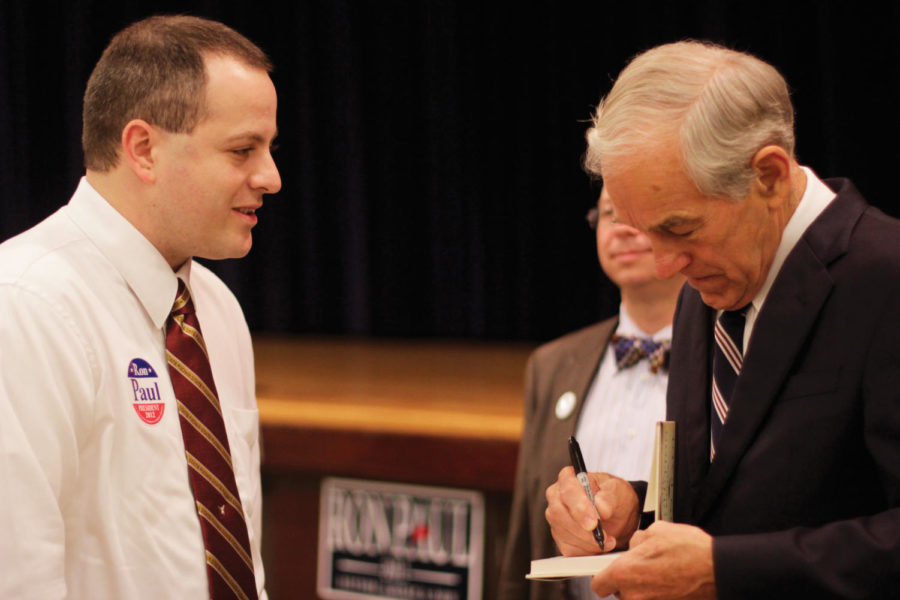Snell: Abortion a violation of rights but a state issue, according to Paul
Photo: Nicole Wiegand/Iowa State Daily
Presidential candidate and U.S. Rep. Ron Paul, R-Texas, signs a copy of his book for Daily columnist Barry Snell at the Story County GOP Chili Supper in Nevada, Iowa, on Tuesday, Sept. 27. The potluck supper served as a platform for several local politicians to campaign in addition to Paul, who gave the keynote speech of the evening.
October 18, 2011
Author’s note: On the night of Sept. 27,, I had the privilege to ride with presidential candidate Ron Paul on his trip to the airport to fly home. For about 30 private and unscripted minutes, I had the 12-term congressman to myself. The results of that interview comprise more information than possible to convey in a single column, so in the interests of fairness to the reader and appreciation to Dr. Paul for the opportunity, the story has been broken into segments, of which this is the third.
The SUV cruised through the dark down Highway 35, congressman Ron Paul in the backseat on the driver’s side and me sitting next to him. Dr. Paul had just finished rebutting concerns printed in the Daily about his position on Medicare and Social Security. I followed up by hitting him with what many consider a weightier issue: abortion. The same person in the Daily who was upset by Paul’s stance on Medicare and Social Security was also unhappy with his stance on abortion.
Paul is an absolutist when it comes to abortion. He does not believe one should be had under any circumstances. However, as always, there’s more to the story than meets the sound byte.
I quoted the Daily’s complainant, asking in cases of rape or incest if Paul was taking the individual rights of women into account. The congressman nodded thoughtfully, took a sip of his drink from McDonalds and said, “I know that bad things happen sometimes, but I think it’s better for the principles of liberty to be on the side of life. I understand what that person is trying to say, but if we believe that we have our rights because we’re alive, then we can’t really have liberty at all if we don’t protect life.”
Paul has beliefs modern politicos consider “old school.” However, in 1776, he would have been right at home and would have received more than a few high-fives from guys like Thomas Jefferson. Paul’s position on abortion stems from the classical liberal philosophy of natural rights.
The idea is that we have rights not because any monarch or government says we do, but by simple virtue of being alive. Hence, the ultimate denial of rights is non-consensual death at another’s hand. This is a main reason why murder is wrong in classical liberal philosophy.
This is also why Paul believes abortion is wrong: One person’s right to live trumps another’s right to kill them. “What message is it if we say you have rights because you’re alive but then deny someone their life?” he asked me.
Then there’s the personal side of this story. While a young medical resident Dr. Paul, now a licensed OB-GYN who’s given birth to more than 4,000 children, witnessed a baby discarded after a live birth, tossed into a bucket on the floor. As Paul tells it, the newborn’s cries were ignored as it was left to die while doctors and nurses tended to the mother.
A few minutes later, in a hospital room down the hall, Paul witnessed another birth. This time, though, the baby was tended to and fretted over by the staff. “Why was that baby chosen to live while the other one was chosen to die?” Paul asks, clearly emotional as the memory comes back.
Unmistakably, this left a mark on the congressman’s heart and soul, and has affected his feelings on abortion ever since. But Paul’s stance is more complicated still. I asked him about abortions conducted prior to the development of the fetus.
“We already acknowledge life begins at conception other ways [even though there’s no specific law saying so],” he answered. “We have laws protecting life at conception. As a doctor, I’m liable if I do something wrong after conception that affects the pregnancy. If you injure a pregnant woman and harm the pregnancy, you’re criminally liable. And we have inheritance rights after conception too.” On these points, Paul appears to simply be consistent with other laws and principles, which he is renowned in Congress for being.
One might wonder at this point about Paul’s position on abortion to save the mother. “In all my years [as an OB-GYN], I never saw a case where the mother needed an abortion to save her life.”
The congressman stated he never personally saw it, suggesting it is a rare occurrence, though he never denied the possibility. Paul’s next point answers the dangling question there:
“A woman’s health care should be a private matter between her and her doctor,” Paul explained. “The government shouldn’t get in the middle.” Bottom line, if a woman really needs an abortion, so be it — at least so far as the federal government is concerned.
Despite his personal feelings on abortion, congressman Paul is not in favor of federal regulation for or against it (he is against oddities like partial birth abortion, however), thus leaving the issue to the states. “The federal government has no business involving itself in abortion.”







